
This week, a sampling of three studios’/producers’ works from the 1960’s – Jay Ward, Total Television, and King Features. All major names in early television work, they had virtually disappeared by the end of the decade, except in perpetual reruns.
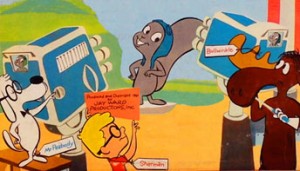 Rocky and His Friends, and later The Bullwinkle Show, offer us two inconsistent story arcs in the squirrel and moose’s continuing adventures, both originating out of efforts to predict the weather for Frostbite Falls, Minnesota (a task which isn’t easy, as the town seems to endure every extreme of weather known to mankind). In Greenpernt Oogle (air dates December 1-29, 1960), infallible predictions originate from Bullwinkle, thanks to the throbbing of a sizeable bunion upon one of his hooves. He is so accurate, the local little league team, who calls him for predictions before every game, has never had a rain-out. Bullwinkle’s services are om constant request by citizens of the town, who call the phone of the moose and squirrel at all hours to see how weather will be for their birthdays, picnics, etc. This leaves Bullwinkle rather exhausted after a typical day, and the moose snores in a sound sleep at night while an equally sleepy Rocky tries to cover for him on the phone. But one night, something other than phone ringing disturbs the squirrel’s evening. Two gangster-style hoods enter the window, seize Rocky, and leave him bound and gagged, tied to a chair. They proceed to the sleeping Bullwinkle, where one of them ensures the moose will continue to sleep with a bottle of sleeping pills – which he uses to whack Bullwinkle over the head with, without bothering to open the bottle. The bunion foot is then encased by the mobsters in a packing crate, and the unconscious moose is carried off to a nearby abandoned airstrip, loaded on a plane, and moose-napped. Rocky eventually frees himself, locates a sheriff (only by a personal visit, since the local telephone operator, like Myrt to Fibber McGee, is too busy trying to engage Rocky in local small talk to put Rocky’s call through), and follows a set of tracks with the lawman in attempt to trace Bullwinkle’s whereabouts. The tracks lead over the state line, and the sheriff informs the squirrel that he has no jurisdiction to proceed further. It is now a federal case, and Rocky flies to Washington to enlist the government’s help. Unfortunately, he is shunted from department to department to department (an FBI man informing him that the great thing about Washington is that you always go around in the right circles).
Rocky and His Friends, and later The Bullwinkle Show, offer us two inconsistent story arcs in the squirrel and moose’s continuing adventures, both originating out of efforts to predict the weather for Frostbite Falls, Minnesota (a task which isn’t easy, as the town seems to endure every extreme of weather known to mankind). In Greenpernt Oogle (air dates December 1-29, 1960), infallible predictions originate from Bullwinkle, thanks to the throbbing of a sizeable bunion upon one of his hooves. He is so accurate, the local little league team, who calls him for predictions before every game, has never had a rain-out. Bullwinkle’s services are om constant request by citizens of the town, who call the phone of the moose and squirrel at all hours to see how weather will be for their birthdays, picnics, etc. This leaves Bullwinkle rather exhausted after a typical day, and the moose snores in a sound sleep at night while an equally sleepy Rocky tries to cover for him on the phone. But one night, something other than phone ringing disturbs the squirrel’s evening. Two gangster-style hoods enter the window, seize Rocky, and leave him bound and gagged, tied to a chair. They proceed to the sleeping Bullwinkle, where one of them ensures the moose will continue to sleep with a bottle of sleeping pills – which he uses to whack Bullwinkle over the head with, without bothering to open the bottle. The bunion foot is then encased by the mobsters in a packing crate, and the unconscious moose is carried off to a nearby abandoned airstrip, loaded on a plane, and moose-napped. Rocky eventually frees himself, locates a sheriff (only by a personal visit, since the local telephone operator, like Myrt to Fibber McGee, is too busy trying to engage Rocky in local small talk to put Rocky’s call through), and follows a set of tracks with the lawman in attempt to trace Bullwinkle’s whereabouts. The tracks lead over the state line, and the sheriff informs the squirrel that he has no jurisdiction to proceed further. It is now a federal case, and Rocky flies to Washington to enlist the government’s help. Unfortunately, he is shunted from department to department to department (an FBI man informing him that the great thing about Washington is that you always go around in the right circles).
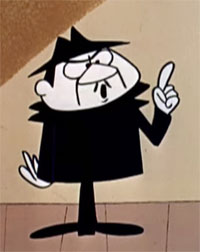 He is finally directed to the weather bureau on account of Bullwinkle’s bunion, and meets up with old friend Captain Peter “wrongway” Peachfuzz, who has been transferred to such department due to his uncanny knack, like most weathermen, of getting everything wrong. Despite a veritable warehouse of scientific weather measuring devices at his disposal, Peter’s own means of weather predicting is to name a city, then toss a dart at a dart board marked with targets naming various kinds of weather. (When a dart lands on the line dividing two weather targets from one another, Peachfuzz’s prediction is “Unsettled”.) Peachfuzz agrees to accompany Rocky by plane in attempt to track Bullwinkle’s kidnappers. He of course sends out instructions to air traffic control leading them to believe he and the squirrel are to be shot down. Peter’s dumb luck allows him to evade a squadron of jet fighters, and actually catch up with Bullwinkle’s plane, which has been following a zig-zag course to avoid detection. But a cloudy smoke screen shot from the villains’ plane blots out our heroes’ view, and Peachfuzz pulls the wrong switch in trying to evade it, cutting the fuel and crashing his plane into the ocean.
He is finally directed to the weather bureau on account of Bullwinkle’s bunion, and meets up with old friend Captain Peter “wrongway” Peachfuzz, who has been transferred to such department due to his uncanny knack, like most weathermen, of getting everything wrong. Despite a veritable warehouse of scientific weather measuring devices at his disposal, Peter’s own means of weather predicting is to name a city, then toss a dart at a dart board marked with targets naming various kinds of weather. (When a dart lands on the line dividing two weather targets from one another, Peachfuzz’s prediction is “Unsettled”.) Peachfuzz agrees to accompany Rocky by plane in attempt to track Bullwinkle’s kidnappers. He of course sends out instructions to air traffic control leading them to believe he and the squirrel are to be shot down. Peter’s dumb luck allows him to evade a squadron of jet fighters, and actually catch up with Bullwinkle’s plane, which has been following a zig-zag course to avoid detection. But a cloudy smoke screen shot from the villains’ plane blots out our heroes’ view, and Peachfuzz pulls the wrong switch in trying to evade it, cutting the fuel and crashing his plane into the ocean.
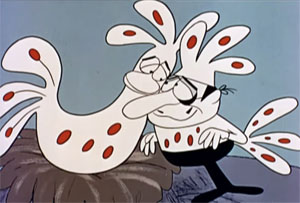 The plane carrying Bullwinkle arrives at its destination – a remote island known by the unusual name of New Greenpernt. Bullwinkle awakens to find himself reclining in palatial settings, his bunion-hoof resting on a velvet pillow, and a harem-style servant girl at his beck and call. It all seems like a dream, until a trumpet fanfare announces the entrance of King Bushwick the “Thoidy-Thoid” (a Brooklyn-accented sailor who fell off a battleship and somehow was proclaimed king by the local natives) and a burly headsman-guard. Bullwinkle is proclaimed the “substitute wizard” – but ordered to make with predictions pronto, as the kingdom is facing a crisis. Local economy has been dependent on a source of fortune prediction unique to their island – a rare bird known as the Oogle, who once a month (although writers forget this point as the story progresses, the Oogle seeming to perform its feat much more frequently in later chapters) lays a boulder-sized egg, hollow but containing the printed equivalent of a Chinese fortune-cookie prediction inside, infallibly predicting any number of profitable events. However, the Oogle has disappeared, sending the local economy tumbling. Bullwinkle tries to explain that all his bunion predicts is weather, and the King seems willing to accept that in a pinch, placing Bullwinkle on the high mountain peak previously occupied by the Oogle. However, while it is sunny at Bullwinkle’s elevation, it is pouring rain on the lowlands below, so Bullwinkle’s bunion proves of no practical use for general forecasts. Bullwinkle is sentenced to meet the headsman’s axe – just as Rocky and Peachfuzz wash up on the same island, and are also captured (the King announcing the rare event of a “triple-header” feature). Sharp-eyed Rocky, however, spots a clue in the sand – not one, but two sets of Oogle tracks. He volunteers our heroes’ services to track down the Oogle to avoid beheading. The tracks lead out to sea, so out boys and the King follow their direction in a small boat.
The plane carrying Bullwinkle arrives at its destination – a remote island known by the unusual name of New Greenpernt. Bullwinkle awakens to find himself reclining in palatial settings, his bunion-hoof resting on a velvet pillow, and a harem-style servant girl at his beck and call. It all seems like a dream, until a trumpet fanfare announces the entrance of King Bushwick the “Thoidy-Thoid” (a Brooklyn-accented sailor who fell off a battleship and somehow was proclaimed king by the local natives) and a burly headsman-guard. Bullwinkle is proclaimed the “substitute wizard” – but ordered to make with predictions pronto, as the kingdom is facing a crisis. Local economy has been dependent on a source of fortune prediction unique to their island – a rare bird known as the Oogle, who once a month (although writers forget this point as the story progresses, the Oogle seeming to perform its feat much more frequently in later chapters) lays a boulder-sized egg, hollow but containing the printed equivalent of a Chinese fortune-cookie prediction inside, infallibly predicting any number of profitable events. However, the Oogle has disappeared, sending the local economy tumbling. Bullwinkle tries to explain that all his bunion predicts is weather, and the King seems willing to accept that in a pinch, placing Bullwinkle on the high mountain peak previously occupied by the Oogle. However, while it is sunny at Bullwinkle’s elevation, it is pouring rain on the lowlands below, so Bullwinkle’s bunion proves of no practical use for general forecasts. Bullwinkle is sentenced to meet the headsman’s axe – just as Rocky and Peachfuzz wash up on the same island, and are also captured (the King announcing the rare event of a “triple-header” feature). Sharp-eyed Rocky, however, spots a clue in the sand – not one, but two sets of Oogle tracks. He volunteers our heroes’ services to track down the Oogle to avoid beheading. The tracks lead out to sea, so out boys and the King follow their direction in a small boat.
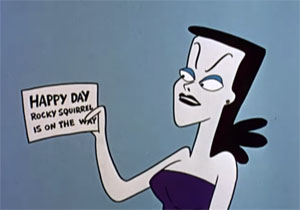 The scene shifts to another remote tall island, with peak suitable for an Oogle’s nest. The perpetrator of the Oogle-napping is of course Boris Badenov, who in flashback is seen seducing the Oogle away from the nest by posing as a male Oogle and assuming Paul Frees’s well-known imitation of French actor Charles Boyer (also used as the voice of Meowrice in “Gay Purr-ee”). Boris is using the Oogle’s predictions for nefarious purposes, asking for directions to the easiest mansions to burgle and banks to rob. But an Oogle fortune alerts him “Happy day. Rocky Squirrel is on the way.” Boris meets his unwanted guests with a barrage of cannon shells and a beach full of buried land mines. More dumb lick saves our heroes, as their small boat descends between wave crests to dodge the cannon fire, and Bullwinkle, clunked on the head by a rock, stumbles a zig-zag path across the beach without hitting a single mine. The Oogle is easily located and freed, but Boris believes he can still knock out their boat on departure with a well-placed shot from his biggest gun. He hurries with Natasha toward the gunning tower, forgetting it is directly across the land-mined beach, until he and Natasha find themselves in the middle of the mine field. A pebble tossed in any direction seems to trigger a mine, and the two villains are stranded in their tracks. The Oogle is returned to New Greenpernt, but doesn’t want to stay, having developed an affection for Rocky and Bullwinkle as its rescuers. Rocky proposes a new candidate for substitute wizard – Captain Peachfuzz. Bullwinkle reminds Rocky that Peachfuzz has never gotten anything right in his life, but Rocky replies, that’s why he’s instructed the natives to do just the opposite of Peter’s predictions! All ends happily, as our heroes sail away with their new feathered friend (who is never seen again for the remainder of the series – oh, well).
The scene shifts to another remote tall island, with peak suitable for an Oogle’s nest. The perpetrator of the Oogle-napping is of course Boris Badenov, who in flashback is seen seducing the Oogle away from the nest by posing as a male Oogle and assuming Paul Frees’s well-known imitation of French actor Charles Boyer (also used as the voice of Meowrice in “Gay Purr-ee”). Boris is using the Oogle’s predictions for nefarious purposes, asking for directions to the easiest mansions to burgle and banks to rob. But an Oogle fortune alerts him “Happy day. Rocky Squirrel is on the way.” Boris meets his unwanted guests with a barrage of cannon shells and a beach full of buried land mines. More dumb lick saves our heroes, as their small boat descends between wave crests to dodge the cannon fire, and Bullwinkle, clunked on the head by a rock, stumbles a zig-zag path across the beach without hitting a single mine. The Oogle is easily located and freed, but Boris believes he can still knock out their boat on departure with a well-placed shot from his biggest gun. He hurries with Natasha toward the gunning tower, forgetting it is directly across the land-mined beach, until he and Natasha find themselves in the middle of the mine field. A pebble tossed in any direction seems to trigger a mine, and the two villains are stranded in their tracks. The Oogle is returned to New Greenpernt, but doesn’t want to stay, having developed an affection for Rocky and Bullwinkle as its rescuers. Rocky proposes a new candidate for substitute wizard – Captain Peachfuzz. Bullwinkle reminds Rocky that Peachfuzz has never gotten anything right in his life, but Rocky replies, that’s why he’s instructed the natives to do just the opposite of Peter’s predictions! All ends happily, as our heroes sail away with their new feathered friend (who is never seen again for the remainder of the series – oh, well).
In a much-shorter story arc, aired several years later on “The Bullwinkle Show”, all memories of Bullwinkle’s forecasting bunion are forgotten. In “The Weather Lady” (circa May, 1963), Frostbite Falls obtains a new scientific means of predicting its unpredictably-variable weather – a mechanical fortune-telling machine purchased from a defunct penny-arcade. Inside a coin-operated booth sits a mechanical, blonde-haired female gypsy fortune teller, who predicts fortunes by shuffling and dealing cards. Her cards always end up four of a kind, and a chart coded to the cards’ denominations tells the Frostbite citizens whether it will be sunny, cloudy, or a blizzard. All is well, until the machine, like the Oogle, is stolen during the night. Boris and Natasha are at it again, though Natasha at first jealously can’t understand why Boris wants to get involved with a “cheap blonde”. Boris’s interest is in the machine’s card-dealing, which he believes can be adapted to profitable use at the poker table. Pitting the machine against man in a friendly game against a river captain, Boris wins a riverboat, and converts it into a floating casino (with the ship renamed the “Hotel Sands” to attract the appropriate clientele). The gypsy machine, whom Boris names “Ruth Booth”, issues an open challenge in advertisement flyers to anyone or anything that it cannot be beaten at cards. Boris begins to garner a fortune.
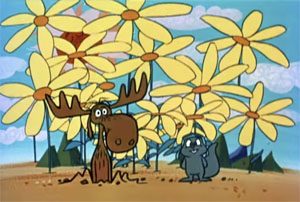 Finally, our heroes get into the story, attempting to track down the stolen machine. The advertisement flyer proves the crucial clue, Rocky deducing who “Ruth Booth” really is. Bullwinkle poses as a riverboat gambler, and Rocky cuts the lights of the gambling room to give Bullwinkle a chance to exit carrying the machine. Instead, Bullwinkle grabs a phone booth in the dark by mistake. Various incidents follow, including a swindle by Boris as the boys attempt to buy the machine back, and even a failed duel between Bullwinkle and Boris. Rocky, however, obtains a new ante of dough to use for one final bet, by working in a circus performing the same high-diving act which he regularly performed in the opening titles to episodes of “Rocky and His Friends” starting in about the second season. With over a thousand dollars in a sack, Rocky challenges Boris that Ruth Booth can be beaten – but on the condition that if Boris loses, he pay off by returning the machine instead of with cash. Since the machine has never lost a hand, Boris and Natasha figure, what have they got to lose? But Rocky refuses to take up the cards himself, stating “My challenger hasn’t arrived yet.” Enter Bullwinkle, towing in the “challenger” – another fortune-telling arcade machine, featuring a male magician named “The Great Predicto”. Predicto deals four kings, and it is up to Ruth to produce four aces. She deals out three such cards, but hesitates before laying down the fourth. Suddenly, she is reshuffling the cards like wild, then throwing them helter-skelter everyplace. Rocky’s hunch was correct – Ruth has become enamored of Predicto, and can’t find it in her heart to beat him, as the two machines make eyes at each other. The lights suddenly go off, and Boris and Natasha make for the lifeboat, each carrying one of the machines. They make it to mid-river, when Natasha reminds Boris that the lifeboat carries a warning of not exceeding a 500-pound weigh limit. The two of them and the two machines are okay as far as weight is concerned – but the sack of money which Boris has also snatched and placed on board is the straw that broke the camel’s back. The villains and machines all submerge into the drink. So Rocky and Bullwinkle, despite foiling the villains, return to Frostbite Falls without their intended goal obtained – but not empty-handed. A new fortune-telling booth is installed – consisting of Bullwinkle dressed as a female gypsy name Moosella. Though the hands he deals often consist of no more than a pair of deuces, the new chart he has fixed up to correlate with the cards seems to predict the weather as accurately as before. Thus, we leave Bullwinkle in the same business where he came in – as Frostbite Falls’ unwitting weather predictor par excellence.
Finally, our heroes get into the story, attempting to track down the stolen machine. The advertisement flyer proves the crucial clue, Rocky deducing who “Ruth Booth” really is. Bullwinkle poses as a riverboat gambler, and Rocky cuts the lights of the gambling room to give Bullwinkle a chance to exit carrying the machine. Instead, Bullwinkle grabs a phone booth in the dark by mistake. Various incidents follow, including a swindle by Boris as the boys attempt to buy the machine back, and even a failed duel between Bullwinkle and Boris. Rocky, however, obtains a new ante of dough to use for one final bet, by working in a circus performing the same high-diving act which he regularly performed in the opening titles to episodes of “Rocky and His Friends” starting in about the second season. With over a thousand dollars in a sack, Rocky challenges Boris that Ruth Booth can be beaten – but on the condition that if Boris loses, he pay off by returning the machine instead of with cash. Since the machine has never lost a hand, Boris and Natasha figure, what have they got to lose? But Rocky refuses to take up the cards himself, stating “My challenger hasn’t arrived yet.” Enter Bullwinkle, towing in the “challenger” – another fortune-telling arcade machine, featuring a male magician named “The Great Predicto”. Predicto deals four kings, and it is up to Ruth to produce four aces. She deals out three such cards, but hesitates before laying down the fourth. Suddenly, she is reshuffling the cards like wild, then throwing them helter-skelter everyplace. Rocky’s hunch was correct – Ruth has become enamored of Predicto, and can’t find it in her heart to beat him, as the two machines make eyes at each other. The lights suddenly go off, and Boris and Natasha make for the lifeboat, each carrying one of the machines. They make it to mid-river, when Natasha reminds Boris that the lifeboat carries a warning of not exceeding a 500-pound weigh limit. The two of them and the two machines are okay as far as weight is concerned – but the sack of money which Boris has also snatched and placed on board is the straw that broke the camel’s back. The villains and machines all submerge into the drink. So Rocky and Bullwinkle, despite foiling the villains, return to Frostbite Falls without their intended goal obtained – but not empty-handed. A new fortune-telling booth is installed – consisting of Bullwinkle dressed as a female gypsy name Moosella. Though the hands he deals often consist of no more than a pair of deuces, the new chart he has fixed up to correlate with the cards seems to predict the weather as accurately as before. Thus, we leave Bullwinkle in the same business where he came in – as Frostbite Falls’ unwitting weather predictor par excellence.
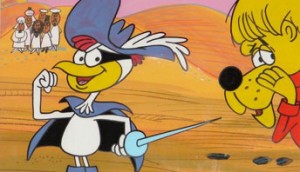 The Elephant Spreader (Super Chicken, 10/14/67) – Citizens of the American town watched over by Super Chicken awaken on a typical morning to a sight that isn;t typical – an elephant is in the room with them – in their bed, or bathtub, or wherever. Even the palacial estate of Henry Cabot Henhouse III (Super Chicken) finds one collapsing the Henhouse bed. Why are they here, and where are they coming from? After consuming the Super Sauce, Super Chicken follows a hunch, and launches his egg-shaped vehicle (The Super Coop) into outer space for a better look at planet earth. Sure enough, the world’s axis has tipped sideways, from the combined weight of the shifted elephants, causing dramatic shifts in the climates by placing equatorial lands where the poles should be. The cause is an Indian rajah, Blackhole of Calcutta, who has tired of the blistering heat of his home land, and by transporting elephants to strategic locations, has converted India into a winter wonderland. Super Chicken fails to deduce any concrete leads to the culprit and his whereabouts, until he complains about the poor Knockwurst in a local deli. Super’s sidekick Fred jokingly remarks, “I’ve heard there’s a new deli in New Delhi.” Super, a Knockwurst connoisseur, takes him at his word, and insists on flying to New Delhi to sample its wares. He knocks on the door of Blackhole’s palace, asking for directions, but Blackhole tells him he wouldn’t like the deli anyway, as the Knockwurst is terrible. Super happens to use his x-ray vision to peer through an eight-foot wall, and spots a row of elephants marked for delivery. He tries to arrest Blackhole, but the villain strikes a gong, summoning three huge palace guards. Super attempts to hurl them out a window, but can’t even budge them. The only available leg he can grab and hurl is that of Fred, whom he mistakenly tosses through the glass and outside. At that moment, Calcutta is struck by its first-ever blizzard. Blackhole and his guards are frozen stiff by the icy winds coming in the window. But Super Chicken and Fred duck inside an inflatable self-heated “Henhouse Hothouse” which Super keeps in his pocket, and wait out the blizzard in heated comfort, with only a slight case of prickly heat. Blackhole is ultimately sentenced to the Black Hole of Calcutta (where the Knockwurst is the worst), and the elephants shipped back to India. Super Chicken and his sidekick are rewarded with a week’s paid vacation in Miami – but a light snowfall at the beach tells Super that one elephant must still be out of place somewhere. Were he more observant, he would note that his partner Fred is nowhere to be seen beside him. An elephant occupies Fred’s beach chair – leading to our own conclusion that Fred was mistakenly shipped off to India. Will this mixup ever be resolved? Tune in next week.
The Elephant Spreader (Super Chicken, 10/14/67) – Citizens of the American town watched over by Super Chicken awaken on a typical morning to a sight that isn;t typical – an elephant is in the room with them – in their bed, or bathtub, or wherever. Even the palacial estate of Henry Cabot Henhouse III (Super Chicken) finds one collapsing the Henhouse bed. Why are they here, and where are they coming from? After consuming the Super Sauce, Super Chicken follows a hunch, and launches his egg-shaped vehicle (The Super Coop) into outer space for a better look at planet earth. Sure enough, the world’s axis has tipped sideways, from the combined weight of the shifted elephants, causing dramatic shifts in the climates by placing equatorial lands where the poles should be. The cause is an Indian rajah, Blackhole of Calcutta, who has tired of the blistering heat of his home land, and by transporting elephants to strategic locations, has converted India into a winter wonderland. Super Chicken fails to deduce any concrete leads to the culprit and his whereabouts, until he complains about the poor Knockwurst in a local deli. Super’s sidekick Fred jokingly remarks, “I’ve heard there’s a new deli in New Delhi.” Super, a Knockwurst connoisseur, takes him at his word, and insists on flying to New Delhi to sample its wares. He knocks on the door of Blackhole’s palace, asking for directions, but Blackhole tells him he wouldn’t like the deli anyway, as the Knockwurst is terrible. Super happens to use his x-ray vision to peer through an eight-foot wall, and spots a row of elephants marked for delivery. He tries to arrest Blackhole, but the villain strikes a gong, summoning three huge palace guards. Super attempts to hurl them out a window, but can’t even budge them. The only available leg he can grab and hurl is that of Fred, whom he mistakenly tosses through the glass and outside. At that moment, Calcutta is struck by its first-ever blizzard. Blackhole and his guards are frozen stiff by the icy winds coming in the window. But Super Chicken and Fred duck inside an inflatable self-heated “Henhouse Hothouse” which Super keeps in his pocket, and wait out the blizzard in heated comfort, with only a slight case of prickly heat. Blackhole is ultimately sentenced to the Black Hole of Calcutta (where the Knockwurst is the worst), and the elephants shipped back to India. Super Chicken and his sidekick are rewarded with a week’s paid vacation in Miami – but a light snowfall at the beach tells Super that one elephant must still be out of place somewhere. Were he more observant, he would note that his partner Fred is nowhere to be seen beside him. An elephant occupies Fred’s beach chair – leading to our own conclusion that Fred was mistakenly shipped off to India. Will this mixup ever be resolved? Tune in next week.
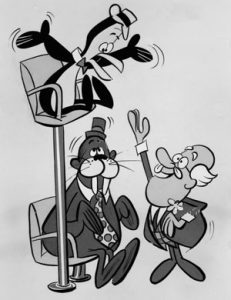 Moving on to a studio often confused with or paired in distribution with Jay Ward productions (due to the two studios’ common use of Mexican Gamma Productions for their inking, painting, and distribution), Total Television gave us a few weather-related items. First, The Rainmakers (Tennessee Tuxedo and His Tales, 10/5/63) – In one of the earliest installments of the series, Tennessee and his pal Chumley hop over the wall of the Zoo dressed in raincoats, with goal set to pass themselves off as weathermen – because they look like weathermen. They are hired by the Weather Bureau (although their Chief thinks they look more like a penguin and a walrus). Having no idea how to do their jobs, Tennessee and Chumley lounge around the bureau, waiting to figure out when to take their coffee break. Suddenly, the door of the office flies open, and a disgruntled farmer, whose cauliflower crop is drying up because of three weeks wrong predictions about forthcoming rain, starts shooting up the place, demanding rain, or else a return visit to do more severe damage with the firearm. Tennessee orders Chumley to go out and make it rain. Chumley only succeeds in making a lot of noise by learning from a library book about Indian rain dances. It’s time to see Phineas J. Whoopee, the man with all the answers. On the 3-dimensionnal blackboard, Whoopee shows them how droplets in clouds form into rain, and how they can be induced to grow faster by seeding them with dry ice. The three go up in a plane, and Chumley is assigned to do the seeding. The walrus fails to reckon on his own weight, and hops out of the plane, thinking he can walk atop the cloud. Tennessee hops out after him to try and stop him, and fortunately, both are wearing parachutes, which Chumley at least had the brains to use when he fell through the cloud’s surface. However, Chumley announces “Mission accomplished”, as he left the box of dry ice within the cloud as he passed. A rainstorm develops on cue, and the two find themselves descending upon the weather bureau, where they presume they will be greeted as heroes. Instead, an angry mob meets them, as the rest of the public was enjoying it sunny, and raise complaints about the rain ruining their golf games, picnics, spoiling their hairdos, etc. You obviously can’t please everybody, and Tennessee and Chumley, recognized as a penguin and a walrus, become the target of the mob to run them out of town. Instead, they run back to the zoo, where, within their arctic-themed enclosure, Chumley recites a bad poem about their harrowing experience, then descends into the water of their pool. Tennessee closes with the observation that sometimes Chumley is just too deep.
Moving on to a studio often confused with or paired in distribution with Jay Ward productions (due to the two studios’ common use of Mexican Gamma Productions for their inking, painting, and distribution), Total Television gave us a few weather-related items. First, The Rainmakers (Tennessee Tuxedo and His Tales, 10/5/63) – In one of the earliest installments of the series, Tennessee and his pal Chumley hop over the wall of the Zoo dressed in raincoats, with goal set to pass themselves off as weathermen – because they look like weathermen. They are hired by the Weather Bureau (although their Chief thinks they look more like a penguin and a walrus). Having no idea how to do their jobs, Tennessee and Chumley lounge around the bureau, waiting to figure out when to take their coffee break. Suddenly, the door of the office flies open, and a disgruntled farmer, whose cauliflower crop is drying up because of three weeks wrong predictions about forthcoming rain, starts shooting up the place, demanding rain, or else a return visit to do more severe damage with the firearm. Tennessee orders Chumley to go out and make it rain. Chumley only succeeds in making a lot of noise by learning from a library book about Indian rain dances. It’s time to see Phineas J. Whoopee, the man with all the answers. On the 3-dimensionnal blackboard, Whoopee shows them how droplets in clouds form into rain, and how they can be induced to grow faster by seeding them with dry ice. The three go up in a plane, and Chumley is assigned to do the seeding. The walrus fails to reckon on his own weight, and hops out of the plane, thinking he can walk atop the cloud. Tennessee hops out after him to try and stop him, and fortunately, both are wearing parachutes, which Chumley at least had the brains to use when he fell through the cloud’s surface. However, Chumley announces “Mission accomplished”, as he left the box of dry ice within the cloud as he passed. A rainstorm develops on cue, and the two find themselves descending upon the weather bureau, where they presume they will be greeted as heroes. Instead, an angry mob meets them, as the rest of the public was enjoying it sunny, and raise complaints about the rain ruining their golf games, picnics, spoiling their hairdos, etc. You obviously can’t please everybody, and Tennessee and Chumley, recognized as a penguin and a walrus, become the target of the mob to run them out of town. Instead, they run back to the zoo, where, within their arctic-themed enclosure, Chumley recites a bad poem about their harrowing experience, then descends into the water of their pool. Tennessee closes with the observation that sometimes Chumley is just too deep.
 In The Silver Thieves (Underdog, 12/4-11/65), the city is in a panic, as creatures who look like ghosts appear at every location where there is silverware, silver tea sets, etc., demanding that the items be handed over. When they meet with resistance, the creatures point a finger, turn black, and “lightning jolt” their victims with a bolt of energy that renders them frozen in their tracks and helpless. The “ghosts” then transform themselves into the shape of clouds and float the silver out the window. A call goes out for Underdog, to which Underdog does not at first respond, or even hear, as he is engaged in a battle with giant sharks on the other side of the world. He returns to his apartment in a tired state, hoping to get a little sleep. To his surprise, he is awakened when his apartment is entered by one of the “ghosts”, seeking his silver ring (in which he keeps the patented Underdog super energy pill). The ghost civilly offers to let Underdog keep the pill, and just surrender the ring, but Underdog won’t go along with it. Underdog charges at the “ghost” – but goes right through him. Underdog’s best attacks prove utterly useless, as each blow goes right through and has no effect upon his adversary. Underdog finds himself in a game of dodging, trying to stay one jump ahead of lightning jolts that are wrecking his room. The battle shifts outdoors to avoid the room damage, but Underdog’s energy finally weakens, and he is hit, freezing in mid-step upon the pavement. His ring is removed from his finger, and the ghost leaves him there, and makes his escape.
In The Silver Thieves (Underdog, 12/4-11/65), the city is in a panic, as creatures who look like ghosts appear at every location where there is silverware, silver tea sets, etc., demanding that the items be handed over. When they meet with resistance, the creatures point a finger, turn black, and “lightning jolt” their victims with a bolt of energy that renders them frozen in their tracks and helpless. The “ghosts” then transform themselves into the shape of clouds and float the silver out the window. A call goes out for Underdog, to which Underdog does not at first respond, or even hear, as he is engaged in a battle with giant sharks on the other side of the world. He returns to his apartment in a tired state, hoping to get a little sleep. To his surprise, he is awakened when his apartment is entered by one of the “ghosts”, seeking his silver ring (in which he keeps the patented Underdog super energy pill). The ghost civilly offers to let Underdog keep the pill, and just surrender the ring, but Underdog won’t go along with it. Underdog charges at the “ghost” – but goes right through him. Underdog’s best attacks prove utterly useless, as each blow goes right through and has no effect upon his adversary. Underdog finds himself in a game of dodging, trying to stay one jump ahead of lightning jolts that are wrecking his room. The battle shifts outdoors to avoid the room damage, but Underdog’s energy finally weakens, and he is hit, freezing in mid-step upon the pavement. His ring is removed from his finger, and the ghost leaves him there, and makes his escape.
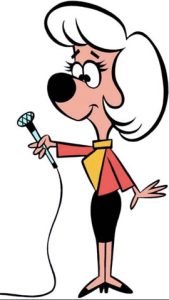 Sweet Polly Purebread is combing the town in a mobile news truck, searching for Underdog. She is the first to spot him, but is shocked to find him frozen and responseless to her pleas for his help against the ghosts. A passing cameraman witnessed the final moments of the preceding battle, and shows Polly a photo of Underdog receiving the lightning jolt. The townsfolk stand around, wondering how to snap him out of it. Polly suggests tossing water on him. A drenching of water begins to make Underdog sizzle and short-circuit, but he still does not become responsive, and smoke begins to pour off him. Polly thus suggests covering him in sand to smother the potential fire. The townsfolk bury Underdog in a pile of sand, but still there seems to be no action underneath. Then, the hill begins to vibrate, and Underdog blasts out of the top of it, revived. Underdog explains that the sand was just what he needed, as it drained off the electrical energy. Polly fills him in about the crime wave upon silver, and the ghost-like creatures performing it. Underdog scoffs that ghosts only exist in fairy tales, and, realizing that silver is their goal, uses his “computer brain” to put two and two together. He recalls that there exists a faraway planet called Cumulus, ruled over by King Cumulus Regulus – a land of cloud men. Why would they need silver? Because “Every cloud must have a silver lining.” And so, although still weak and without his energy pill, Underdog sets off into outer space for the planet, with Polly insisting upon going along in case he needs help.
Sweet Polly Purebread is combing the town in a mobile news truck, searching for Underdog. She is the first to spot him, but is shocked to find him frozen and responseless to her pleas for his help against the ghosts. A passing cameraman witnessed the final moments of the preceding battle, and shows Polly a photo of Underdog receiving the lightning jolt. The townsfolk stand around, wondering how to snap him out of it. Polly suggests tossing water on him. A drenching of water begins to make Underdog sizzle and short-circuit, but he still does not become responsive, and smoke begins to pour off him. Polly thus suggests covering him in sand to smother the potential fire. The townsfolk bury Underdog in a pile of sand, but still there seems to be no action underneath. Then, the hill begins to vibrate, and Underdog blasts out of the top of it, revived. Underdog explains that the sand was just what he needed, as it drained off the electrical energy. Polly fills him in about the crime wave upon silver, and the ghost-like creatures performing it. Underdog scoffs that ghosts only exist in fairy tales, and, realizing that silver is their goal, uses his “computer brain” to put two and two together. He recalls that there exists a faraway planet called Cumulus, ruled over by King Cumulus Regulus – a land of cloud men. Why would they need silver? Because “Every cloud must have a silver lining.” And so, although still weak and without his energy pill, Underdog sets off into outer space for the planet, with Polly insisting upon going along in case he needs help.
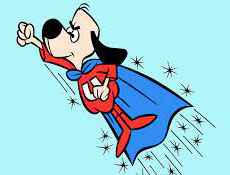 On the planet, the cloud men deposit their stolen silver into a hopper, where a crane deposits the silver onto a conveyor belt leading to a melting pot. The silver is transformed into a fine mist, to be sprayed into the linings of the cloud men. But the supply is still far short of providing every cloud with the necessary lining, and the king’s advisors fear revolution, as the planet’s only home resource is not silver, but gold. However, information arrives of one much greater reserve of silver on earth – the U.S. Mint (back in the days when silver was still part of the content of coins). The king orders a mass assault upon the treasury, just as Underdog and Polly arrive. As the King is as easy to soar through as Underdog’s previous adversary, Underdog still finds himself at a loss on how to fight, and his energy depletes again. Even Polly tries to resist, but the two are zapped by the King’s lightning, and dropped down the hopper, while the planet’s troops “storm” the mint. All branches of the military are powerless to resist the cloud men’s lightning jolts. But back on their own planet, the King has failed to reckon upon Underdog and Polly falling upon a pile of the other silver objects dropped down the hopper, which again serves the purpose of draining off the lightning energy, reviving them. They find themselves approaching the melting pot – but Underdog also makes a find – his ring. The energy pill is ingested, and Underdog soars Polly out of the hopper to safety. But the King and his troops have returned with their successful haul. Underdog, now at full strength, flies at “lightning speed”, continuously dodging the King’s lightning jolts, until the King himself begins tiring. Underdog is now able to fly in close enough to grab the King’s wrists (I though Underdog’s hands only go right through the King’s body), and turn the tips of the King’s fingers directly upon each other – causing a short circuit, depleting the King of his lightning energy. Rather than merely turn to his troops for support, the powerless King stops long enough to talk turkey. Understanding his need for silver, Underdog and Polly suggest a better way to obtain it than stealing – trade for it, with the planet’s abundant gold supply. A healthy trade deal with Earth results in every cloud man living happily with his new coat of silver, and Underdog returning to Earth a hero as usual – and as usual, mistaken as a plane, a bird, and even frog.
On the planet, the cloud men deposit their stolen silver into a hopper, where a crane deposits the silver onto a conveyor belt leading to a melting pot. The silver is transformed into a fine mist, to be sprayed into the linings of the cloud men. But the supply is still far short of providing every cloud with the necessary lining, and the king’s advisors fear revolution, as the planet’s only home resource is not silver, but gold. However, information arrives of one much greater reserve of silver on earth – the U.S. Mint (back in the days when silver was still part of the content of coins). The king orders a mass assault upon the treasury, just as Underdog and Polly arrive. As the King is as easy to soar through as Underdog’s previous adversary, Underdog still finds himself at a loss on how to fight, and his energy depletes again. Even Polly tries to resist, but the two are zapped by the King’s lightning, and dropped down the hopper, while the planet’s troops “storm” the mint. All branches of the military are powerless to resist the cloud men’s lightning jolts. But back on their own planet, the King has failed to reckon upon Underdog and Polly falling upon a pile of the other silver objects dropped down the hopper, which again serves the purpose of draining off the lightning energy, reviving them. They find themselves approaching the melting pot – but Underdog also makes a find – his ring. The energy pill is ingested, and Underdog soars Polly out of the hopper to safety. But the King and his troops have returned with their successful haul. Underdog, now at full strength, flies at “lightning speed”, continuously dodging the King’s lightning jolts, until the King himself begins tiring. Underdog is now able to fly in close enough to grab the King’s wrists (I though Underdog’s hands only go right through the King’s body), and turn the tips of the King’s fingers directly upon each other – causing a short circuit, depleting the King of his lightning energy. Rather than merely turn to his troops for support, the powerless King stops long enough to talk turkey. Understanding his need for silver, Underdog and Polly suggest a better way to obtain it than stealing – trade for it, with the planet’s abundant gold supply. A healthy trade deal with Earth results in every cloud man living happily with his new coat of silver, and Underdog returning to Earth a hero as usual – and as usual, mistaken as a plane, a bird, and even frog.
 Finally, we sample the various production releases of Al Brodax at King Features Syndicate. Their first success was in reviving interest in Popeye through a flock of new episodes, with production split to five different studios.
Finally, we sample the various production releases of Al Brodax at King Features Syndicate. Their first success was in reviving interest in Popeye through a flock of new episodes, with production split to five different studios.
Weather Watchers (Popeye, circa 1960 – Jack Kinney, dir.) – Another of those Jack Kinney TV productions that probably read coherently on storyboard, had some decent plot ideas, but somehow lost something in the transition to film, developing plot holes, dialogue inconsistencies, and the feeling that something was cut to save on time and budget. The first half progresses reasonably well. Olive is chief of the weather bureau, taking calls at her desk registering complaints about the non-stop rain outside the office window – in spite of a prediction that today would be fair and sunny. Opportunist and would-be weatherman Bluto (aka Brutus for this run of TV cartoons) calls up Olive and offers his services to take over the bureau’s predictions. Olive takes his information for her files, but informs him there are no job openings at present – faithfully attempting to stay loyal to her long-time weather predictor, Popeye. After hanging up the call, she gives a holler for Popeye to come in – but finds him already there across the desk. She informs the sailor of the complaints she’s received on his last prediction, and tells him she wants improvement or else. Popeye apologizes for the goof-up, and begins his standard ritual to come up with tomorrow’s weather report. No aching in his back. No throbbing of his bunions. A spin of a wheel of fortune with spaces marked out for various weather conditions comes up with a winning forecast of fair and sunny. “You better be right, because I want to wear my new hat tomorrow”, says Olive, while Popeye secretly keeps his fingers crossed that his prediction really will come true.
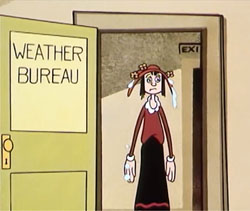 Bluto watches the evening newscast, catching TV weatherman Wimpy relaying Popeye’s forecast to the world. Bluto decides that if he can make the forecast go wrong, he might just land that weatherman job. So, he hires a helicopter, flying above the clouds to do a little cloud seeding. Not content with old reliable dry ice, Bluto “spices” things up a bit, by liberally depositing red pepper upon the cloudy surface, and adding a full box of moth balls. The clouds develop a bad case of sneezes, and within minutes, are shooting out a downpour of combined rain and mothballs, adding a few thunderclaps to boot. Olive, just venturing out on the street with her new flowered chapeau, is suddenly drenched, and her hat droops like a wilted rose petal. She appears at the door of the weather bureau, looking somewhat akin to a half-drowned cat. Popeye can’t understand this turn of events, but Olive remarks upon his prediction, “Balmy? You’re balmy!” (A plot inconsistency, as the word “balmy” was never used in the earlier scenes, yet is referred to twice in this and later dialogue.) Popeye is fired on the spot, and Olive places a call to Bluto, offering him the job.
Bluto watches the evening newscast, catching TV weatherman Wimpy relaying Popeye’s forecast to the world. Bluto decides that if he can make the forecast go wrong, he might just land that weatherman job. So, he hires a helicopter, flying above the clouds to do a little cloud seeding. Not content with old reliable dry ice, Bluto “spices” things up a bit, by liberally depositing red pepper upon the cloudy surface, and adding a full box of moth balls. The clouds develop a bad case of sneezes, and within minutes, are shooting out a downpour of combined rain and mothballs, adding a few thunderclaps to boot. Olive, just venturing out on the street with her new flowered chapeau, is suddenly drenched, and her hat droops like a wilted rose petal. She appears at the door of the weather bureau, looking somewhat akin to a half-drowned cat. Popeye can’t understand this turn of events, but Olive remarks upon his prediction, “Balmy? You’re balmy!” (A plot inconsistency, as the word “balmy” was never used in the earlier scenes, yet is referred to twice in this and later dialogue.) Popeye is fired on the spot, and Olive places a call to Bluto, offering him the job.
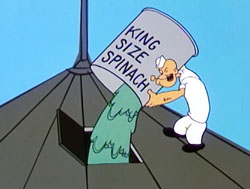 Popeye trudges home dejected and frustrated at losing his position after all his years of faithful service to the bureau. The rain is still coming down heavily upon him, and Popeye takes notice of the “hail”, bouncing oddly off the pavement. He picks up one, eyeing it suspiciously as to its texture, and sniffs it. Moth balls! Who should now pass him on the street but Bluto, who addresses him sarcastically, “Hi there, balmy!” Popeye’s suspicion is aroused that Bluto had something to do with this weird weather. That evening, Popeye listens to Wimpy broadcasting Bluto’s first report. Wimpy comments that he’s heard there was a shake-up at the weather bureau, and already the weather’s improving. A bright sunny day is predicted. Popeye supposes Bluto might be right, but, eyeing a water tower atop a tall building near the weather bureau, declares that he believes the tower will prove Bluto wrong. The next day, Popeye pays a visit to the tower, opening its roof, and pouring into its water a huge king-size can of spinach. Then, Popeye descends to the base of the tower, finding a valve and faucet head for release of the water. Instead of merely opening the valve, Popeye blows with extreme force into the faucet pipe. The tower above flips its lid with explosive power, casting into the skies and down to earth its entire supply of water-logged spinach, resulting in weather no one could have predicted correctly – green rain! Another likely edit in the dialogue script is revealed, as Olive calls in Bluto, reminding him of a previously unheard boast that if his first prediction wasn’t right on the nose, he’d eat it. “Start eating!”, Olive orders, stuffing a page of Bluto’s report into his mouth. Then comes another entirely unexplained line from Olive, leaving us really questioning what plot points were missing: “Yes, I fell for your moth ball gag.” How did Olive find out? We never even saw her and the moth balls in the same shot – and how did she come to pin it on Bluto anyway? Bluto resorts to his old standby of retaliatory brutality, shaking Olive silly. Popeye appears at the door, and declares that Bluto is all washed up as a weatherman, delivering a single sock that launches Bluto out of the frame, never to be seen further in the cartoon. Popeye assumes his old job duties, and Olive asks for tomorrow’s prediction. “Sunny as your smile, fair as your complexion, and warm as your ever-lovin’ heart”, replies Popeye, to the delighted coos and giggles of Olive. Of course, the sound of a new round of thunder is immediately heard outside, and it begins raining a steady torrent again. “Weather, phooey!”, says Popeye, gazing at the downpour – “It’s as unpredictable as a woman.”
Popeye trudges home dejected and frustrated at losing his position after all his years of faithful service to the bureau. The rain is still coming down heavily upon him, and Popeye takes notice of the “hail”, bouncing oddly off the pavement. He picks up one, eyeing it suspiciously as to its texture, and sniffs it. Moth balls! Who should now pass him on the street but Bluto, who addresses him sarcastically, “Hi there, balmy!” Popeye’s suspicion is aroused that Bluto had something to do with this weird weather. That evening, Popeye listens to Wimpy broadcasting Bluto’s first report. Wimpy comments that he’s heard there was a shake-up at the weather bureau, and already the weather’s improving. A bright sunny day is predicted. Popeye supposes Bluto might be right, but, eyeing a water tower atop a tall building near the weather bureau, declares that he believes the tower will prove Bluto wrong. The next day, Popeye pays a visit to the tower, opening its roof, and pouring into its water a huge king-size can of spinach. Then, Popeye descends to the base of the tower, finding a valve and faucet head for release of the water. Instead of merely opening the valve, Popeye blows with extreme force into the faucet pipe. The tower above flips its lid with explosive power, casting into the skies and down to earth its entire supply of water-logged spinach, resulting in weather no one could have predicted correctly – green rain! Another likely edit in the dialogue script is revealed, as Olive calls in Bluto, reminding him of a previously unheard boast that if his first prediction wasn’t right on the nose, he’d eat it. “Start eating!”, Olive orders, stuffing a page of Bluto’s report into his mouth. Then comes another entirely unexplained line from Olive, leaving us really questioning what plot points were missing: “Yes, I fell for your moth ball gag.” How did Olive find out? We never even saw her and the moth balls in the same shot – and how did she come to pin it on Bluto anyway? Bluto resorts to his old standby of retaliatory brutality, shaking Olive silly. Popeye appears at the door, and declares that Bluto is all washed up as a weatherman, delivering a single sock that launches Bluto out of the frame, never to be seen further in the cartoon. Popeye assumes his old job duties, and Olive asks for tomorrow’s prediction. “Sunny as your smile, fair as your complexion, and warm as your ever-lovin’ heart”, replies Popeye, to the delighted coos and giggles of Olive. Of course, the sound of a new round of thunder is immediately heard outside, and it begins raining a steady torrent again. “Weather, phooey!”, says Popeye, gazing at the downpour – “It’s as unpredictable as a woman.”
For an added bonus, I include below a commercial from about a year before the above-referenced production, which, while featuring no actual animation of Popeye himself, may have been the inspiration for the writing of the cartoon just discussed – advertising a set consisting of a scenic board and rubberized removable stickers, from a popular company known as Colorforms, entitled “Popeye the Weatherman”. It features images of various outfits to wear (much like a set of paper dolls) appropriate for varying weather conditions, such as raincoat and slicker, snow gear, etc. Enjoy.
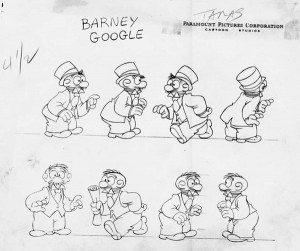 The so-called “King Features Trilogy”, a 1063 combination of three separate cartoon strips adapted to TV, produced Barney’s Winter Carnival (Snuffy Smith and Barney Google, produced at Paramount studios, Seymour Kneitel, dir., Jim Tyer, anim.) A freak snowstorm at Hootin’ Holler covers the hills with snow. Barney Google sees dollar signs instead of snowflakes, and plans to stage every form of winter event in a snow carnival for quick profit. He decides to test out the ski slopes with Snuffy and Jughaid, using makeshift skiing equipment including farming pitchforks as ski poles – but quickly realizes his own claims of skiing prowess are just a bluff. He tries to talk Snuffy and Jughaid into taking a path that is almost flat – but Jughaid points out that the hill is the other way. While Google stammers that such a course might be too much for beginners, Snuffy gives Barney a gentle push from behind with one finger, and Barney is off. He hits a curved incline, does a double backward somersault through the air, and lands back on the summit directly behind Snuffy into the snow. “That was right comical, Google”, Snuffy laughs. Barney replies, “Well, now it’s your turn!”, and with his pitchfork prods Snuffy and Jughaid down the hill. They repeat the somersault move – except while Jughaid lands on the summit, Snuffy hangs upside down from the limbs of a nearby tree. After a fade out, Barney announces that their next step is to learn how to race between flags. “Are you ready”. He asks. “No!” reply Snuffy and Jughaid in unison. “Good”, says Barney, and pushes both of them down the slope. In standard frenetic Tyer animation, Snuffy and Jughaid take out every pole on the hill, collide with each other, and bellyflop to the bottom. “Who won?”, asks Snuffy. “Why, it’s a tie. You’ll have to do it again”, states Barney. But Snuffy and Jughaid respond by both tossing their pitchforks at him, pinning him by his arms to a nearby tree. “Sore losers”, Barney grumpily retorts.
The so-called “King Features Trilogy”, a 1063 combination of three separate cartoon strips adapted to TV, produced Barney’s Winter Carnival (Snuffy Smith and Barney Google, produced at Paramount studios, Seymour Kneitel, dir., Jim Tyer, anim.) A freak snowstorm at Hootin’ Holler covers the hills with snow. Barney Google sees dollar signs instead of snowflakes, and plans to stage every form of winter event in a snow carnival for quick profit. He decides to test out the ski slopes with Snuffy and Jughaid, using makeshift skiing equipment including farming pitchforks as ski poles – but quickly realizes his own claims of skiing prowess are just a bluff. He tries to talk Snuffy and Jughaid into taking a path that is almost flat – but Jughaid points out that the hill is the other way. While Google stammers that such a course might be too much for beginners, Snuffy gives Barney a gentle push from behind with one finger, and Barney is off. He hits a curved incline, does a double backward somersault through the air, and lands back on the summit directly behind Snuffy into the snow. “That was right comical, Google”, Snuffy laughs. Barney replies, “Well, now it’s your turn!”, and with his pitchfork prods Snuffy and Jughaid down the hill. They repeat the somersault move – except while Jughaid lands on the summit, Snuffy hangs upside down from the limbs of a nearby tree. After a fade out, Barney announces that their next step is to learn how to race between flags. “Are you ready”. He asks. “No!” reply Snuffy and Jughaid in unison. “Good”, says Barney, and pushes both of them down the slope. In standard frenetic Tyer animation, Snuffy and Jughaid take out every pole on the hill, collide with each other, and bellyflop to the bottom. “Who won?”, asks Snuffy. “Why, it’s a tie. You’ll have to do it again”, states Barney. But Snuffy and Jughaid respond by both tossing their pitchforks at him, pinning him by his arms to a nearby tree. “Sore losers”, Barney grumpily retorts.
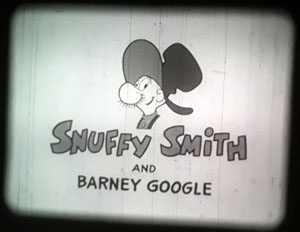 Barney next begins training Snuffy and Jughaid in figure skating. Loweezy joins in, wanting to learn skating too. Barney gets her started from the banks of the pond by saying, “Just push off and glide”. Loweezy gets started all right – but how do you get a bulky mountain woman to stop? She busts through several snowdrifts, then collides with the boys, taking them with her. They all land on a split log, sliding down a steep hill. “A toboggan ride! There’s money in that”, shouts Barney. The log crashes though a henhouse, one bird riding atop Loweezy’s head and shivering from the cold. They land upon another patch of ice, and Snuffy puts a stop to things by breaking a branch off the log and using it as a pole, jamming one end into the ice. The branch bends, then catapults Snuffy off into the horizon. The rest of the cast begin the long walk home, and encounter what appears to be a hillbilly snowman. Barney contemplates the money to be made from a snowman contest, and completes the snow sculpture by poking his fingers in to make holes in the face for two eyes and a mouth. “Google!”, speaks the snowman. It is Snuffy inside. But before the angry hillbilly can speak his mind at Barney, the snow rapidly begins to melt off him – and off the hills as well. The sun has come out, and the freak weather is over. Barney sees this as a financial disaster. “All I’ve got is water.” Then the thought strikes Barney – why not a water carnival? As he touts the financial possibilities of promoting water skiing and the like, Snuffy and Jughaid calmly and deliberately load up their arms with an ample supply of rocks, and approach Barney. Seeing trouble, Barney takes a few steps back, then turns and runs, as the others begin pitching stones at him. As the stones fly toward Barney’s bean, Barney calls back to his pursuers, “Don’t you ever want to get a-HEAD?”
Barney next begins training Snuffy and Jughaid in figure skating. Loweezy joins in, wanting to learn skating too. Barney gets her started from the banks of the pond by saying, “Just push off and glide”. Loweezy gets started all right – but how do you get a bulky mountain woman to stop? She busts through several snowdrifts, then collides with the boys, taking them with her. They all land on a split log, sliding down a steep hill. “A toboggan ride! There’s money in that”, shouts Barney. The log crashes though a henhouse, one bird riding atop Loweezy’s head and shivering from the cold. They land upon another patch of ice, and Snuffy puts a stop to things by breaking a branch off the log and using it as a pole, jamming one end into the ice. The branch bends, then catapults Snuffy off into the horizon. The rest of the cast begin the long walk home, and encounter what appears to be a hillbilly snowman. Barney contemplates the money to be made from a snowman contest, and completes the snow sculpture by poking his fingers in to make holes in the face for two eyes and a mouth. “Google!”, speaks the snowman. It is Snuffy inside. But before the angry hillbilly can speak his mind at Barney, the snow rapidly begins to melt off him – and off the hills as well. The sun has come out, and the freak weather is over. Barney sees this as a financial disaster. “All I’ve got is water.” Then the thought strikes Barney – why not a water carnival? As he touts the financial possibilities of promoting water skiing and the like, Snuffy and Jughaid calmly and deliberately load up their arms with an ample supply of rocks, and approach Barney. Seeing trouble, Barney takes a few steps back, then turns and runs, as the others begin pitching stones at him. As the stones fly toward Barney’s bean, Barney calls back to his pursuers, “Don’t you ever want to get a-HEAD?”
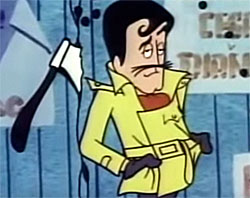 One of Al Brodax’s last productions for King Features in the 1960’s was the James Bond-inspired secret agent spoof. “Cool McCool”, a trench-coated, moustached, dashing but dense do-gooder, whose voice patterns loosely resemble those of Jack Benny. Animation was considerably rougher and cheaper on this series than on prior productions of the Syndicate, farmed out to Australia instead of to any of the usual domestic or international producers of prior series with some theatrical or advertising background. But writing sometimes showed a spark. Bob Kane, of Batman fame, was involved in the series’ creation, with many villains patterned as parodies of Batman villains. One villain who was an original was Hurricane Harry – literally, a human windbag, whose specialty was to “blow you away”. A typical example is The Big Blowout (9/10/66). Record winds are striking everywhere, including the locations of famous landmarks. The Statue of Liberty is leaning at a severe angle. The Eiffel Tower is leaning likewise. And worst of all, the Tower of Pisa is blown straight! The cause of it all? Hurricane Harry, merely exhaling through a megaphone from atop a windmill hideout. He shouts via the megaphone for the world to pay him a ransom of one million dollars, or he will topple all monuments, skyscrapers – and huff and puff, and blow your houses down. Number 1, chief of the secret agent service, calls in McCool on the case, not only to stop the damage to public structures, but to keep Harry’s winds from constantly blowing out Number 1’s lighted cigar. (Note the striking similarity between the sequences in Number 1’s office and those in James Hound episodes for Terrytoons with the Chief, commencing earlier in the same year – both commanders never seen except by shots of arms and pounding fists from their respective office chairs. Who was borrowing from whom?).
One of Al Brodax’s last productions for King Features in the 1960’s was the James Bond-inspired secret agent spoof. “Cool McCool”, a trench-coated, moustached, dashing but dense do-gooder, whose voice patterns loosely resemble those of Jack Benny. Animation was considerably rougher and cheaper on this series than on prior productions of the Syndicate, farmed out to Australia instead of to any of the usual domestic or international producers of prior series with some theatrical or advertising background. But writing sometimes showed a spark. Bob Kane, of Batman fame, was involved in the series’ creation, with many villains patterned as parodies of Batman villains. One villain who was an original was Hurricane Harry – literally, a human windbag, whose specialty was to “blow you away”. A typical example is The Big Blowout (9/10/66). Record winds are striking everywhere, including the locations of famous landmarks. The Statue of Liberty is leaning at a severe angle. The Eiffel Tower is leaning likewise. And worst of all, the Tower of Pisa is blown straight! The cause of it all? Hurricane Harry, merely exhaling through a megaphone from atop a windmill hideout. He shouts via the megaphone for the world to pay him a ransom of one million dollars, or he will topple all monuments, skyscrapers – and huff and puff, and blow your houses down. Number 1, chief of the secret agent service, calls in McCool on the case, not only to stop the damage to public structures, but to keep Harry’s winds from constantly blowing out Number 1’s lighted cigar. (Note the striking similarity between the sequences in Number 1’s office and those in James Hound episodes for Terrytoons with the Chief, commencing earlier in the same year – both commanders never seen except by shots of arms and pounding fists from their respective office chairs. Who was borrowing from whom?).
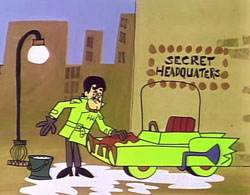 McCool uses his converting super-car, the Coolmobile, as a train, plane, and hovercraft to arrive at a tropical island where Harry’s hideout pinpoints the source of the wind. Harry is attempting to celebrate both his impending riches and his birthday, with his girlfriend Bellows (a wheezing female whose midsection consists of the pleated bellows of a concertina, taking deep inhales before speaking each line). She presents Harry with a birthday cake, asking him to take a deep breath to blow out the candles. Harry inhales – and swallows the cake and candles whole. “This always happens”, he complains. He steps outside, as Cool approaches, bent over in concentrated gaze through a magnifying glass in search of footprints. A blade of Harry’s windmill catches the coattail of Cool’s trenchcoat, lifting the agent to the roof, where he finds himself standing face to toe with Harry’s feet. “It’s time for me to blow”, says Harry, beginning an inhale, but accidentally getting Cool’s magnifying glass stuck in his mouth. Harry threatens to blow Cool to smithereens, but Cool calls him a big blowhard. “Correct”, replies Harry, blowing Cool off the roof and into the side of a tree. Harry ties Cool up with a long rope. Cool again challenges his boasts with the expression, “Go fly a kite”. Exactly what Harry had in mind, with the other end of the rope tied to just such a flying device. With one exhale, Harry launches Cool skyward, to the end of the rope’s limit. Lying on his back in a hammock, Harry prepares for a final blow to launch Cool into outer space. He asks if Cool has any last words, adding “Shoot the breeze.” “Champion idea”, says Cool, managing to free one hand from his bonds and fire a pistol shot at the kite, disintegrating it. He falls, landing atop Harry’s rotund tummy. The impact knocks Harry’s single visible buck tooth loose – which proves to serve as an air plug in the manner of an inflatable raft. Once the tooth is popped, Harry zooms through the skies, deflating like a balloon, and crashing into Bellows, knocking them both cold. Cool is victorious, but when recounting his exploits to Number 1, blows all the papers off his desk – twice. Number 1 presses a button on his desk, ejecting Cool and a throw rug he is standing on out the roof. Cool sails off upon the rug like a flying carpet, as he reflects upon the day. “Harry gave me the wind, and Number 1 gave me the air.”
McCool uses his converting super-car, the Coolmobile, as a train, plane, and hovercraft to arrive at a tropical island where Harry’s hideout pinpoints the source of the wind. Harry is attempting to celebrate both his impending riches and his birthday, with his girlfriend Bellows (a wheezing female whose midsection consists of the pleated bellows of a concertina, taking deep inhales before speaking each line). She presents Harry with a birthday cake, asking him to take a deep breath to blow out the candles. Harry inhales – and swallows the cake and candles whole. “This always happens”, he complains. He steps outside, as Cool approaches, bent over in concentrated gaze through a magnifying glass in search of footprints. A blade of Harry’s windmill catches the coattail of Cool’s trenchcoat, lifting the agent to the roof, where he finds himself standing face to toe with Harry’s feet. “It’s time for me to blow”, says Harry, beginning an inhale, but accidentally getting Cool’s magnifying glass stuck in his mouth. Harry threatens to blow Cool to smithereens, but Cool calls him a big blowhard. “Correct”, replies Harry, blowing Cool off the roof and into the side of a tree. Harry ties Cool up with a long rope. Cool again challenges his boasts with the expression, “Go fly a kite”. Exactly what Harry had in mind, with the other end of the rope tied to just such a flying device. With one exhale, Harry launches Cool skyward, to the end of the rope’s limit. Lying on his back in a hammock, Harry prepares for a final blow to launch Cool into outer space. He asks if Cool has any last words, adding “Shoot the breeze.” “Champion idea”, says Cool, managing to free one hand from his bonds and fire a pistol shot at the kite, disintegrating it. He falls, landing atop Harry’s rotund tummy. The impact knocks Harry’s single visible buck tooth loose – which proves to serve as an air plug in the manner of an inflatable raft. Once the tooth is popped, Harry zooms through the skies, deflating like a balloon, and crashing into Bellows, knocking them both cold. Cool is victorious, but when recounting his exploits to Number 1, blows all the papers off his desk – twice. Number 1 presses a button on his desk, ejecting Cool and a throw rug he is standing on out the roof. Cool sails off upon the rug like a flying carpet, as he reflects upon the day. “Harry gave me the wind, and Number 1 gave me the air.”
NEXT: More studios, more TV, more weather… till then Happy Thanksgiving!


 Charles Gardner is an animation enthusiast who toils by day as a member of LA Law – but by nights and weekends indulges in classic jazz and ragtime as a performer; and studies classic Hollywood cartoons… maybe a little too much.
Charles Gardner is an animation enthusiast who toils by day as a member of LA Law – but by nights and weekends indulges in classic jazz and ragtime as a performer; and studies classic Hollywood cartoons… maybe a little too much.


































































































































































“Speed of lightning! Roar of thunder!
Fighting all who rob or plunder!
Underdog!”
Underdog also fights those who seek to take over the world by controlling its weather, as Simon Bar Sinister did in “Weathering the Storm” (6 & 13 Feb. 1965). Simon’s weather machine resembles a pipe organ, by means of which various weather conditions can be activated by pressing the right keys. The trouble is, the foul weather he creates also causes damage to his house. So Simon and his henchman Cad stow away on a moon launch (along with ace reporter Sweet Polly Purebred, who is covering the event for her TV station) in order to control the earth’s weather from outer space — or, that is, to threaten to do so unless he is appointed dictator of the world. Underdog, who has been busily trying to end a war in Southeast Asia (really), is easily able to nullify the rain, lightning and tornadoes that Simon sends earth’s way; but when Simon threatens to press all the keys on his weather machine at once, our hero knows he is outclassed. He also knows that harm will come to Sweet Polly if Simon sees him coming to the rescue. What to do? Underdog flies to the moon and makes himself invisible by spinning at high speed; then, after creating a fracas between Simon and Cad, Underdog throws the two of them into the weather machine, destroying it. He returns triumphantly to earth with Simon and Cad in tow, and with Sweet Polly in his arms.
An altogether more memorable episode than “The Silver Thieves”, as well as an amusing 1960s period piece, with allusions to the Apollo program, the Vietnam War, Fidel Castro, etc.
Oh, these are three of my favorite TV studios from the golden Age. I especially like the Jay Ward examples you’ve chosen here. I could name another specific example from a television studio, in which the characters battle of foe, who is bent on controlling the weather in many cases. However, I think you will mention these yourself in the coming posts. Have yourself a wonderful Thanksgiving all!
In “Helicopter Hi-Jinks” (31/10/64), the Megapolis Zoo is sweltering in a terrible heat wave, but Tennessee Tuxedo thinks he can make a profit from the situation by selling electric fans to the zoo animals. Unfortunately, his attempts at escape are continually foiled by Stanley Livingston and Flunky. Then Tennessee recalls in a flashback the time when Mr. Whoopee explained to him how a helicopter works. He and Chumley build a pedal-powered helicopter, but Chumley is unable to pedal fast enough to get it off the ground. However, the helicopter’s rotor blades function as a giant fan, and Tennessee charges the zoo animals 50 cents a half hour to cool off in its breeze.
One might think that any cartoon series about Indians in the Western desert would eventually feature a rain dance, and the Go Go Gophers almost did in “Root Beer Riot” (14/10/67). Colonel Kit Coyote tries to force the Gophers to surrender by diverting the course of the stream that provides them with drinking water, and when they discover the dry creek bed, Running Board fears the worst. “No water in stream? Oh, no! Big Sky has turned against Gopher Indians! Must do heap big rain dance! Make Big Sky give us water!” But Ruffled Feather astutely suspects the machinations of the colonel, and so the rain dance is never performed. Too bad! So close….
It got confusing when a Fractured Fairy Tale would appear on “Tennessee Tuxedo” or “Underdog.” It seemed like Jay Ward lost his sense of humor somewhere along the way. The graphic style was pretty standard for cartoons in the 1960s just before Xerography took over completely.
I disagree about him losing his sense of humor. l thought the commercials were still quite good.
Yeah, I also remember DFS/the Program Exchange’s “Dudley Do-Right Show” also including “The King and Odie” and “The Hunter” segments. I’ve also seen one such package combining “Hoppity Hooper” with “The King and Odie”. (Funny enough, “Hoppity Hooper” feels more like a Total Television cartoon at times, but with the Jay Ward Productions voice cast and slightly funnier humor.)
That Popeye had a unique story with good animation. People complain these aren’t as good as the theatricals. How could they be? Lack of money and time led to a lot of crappy cartoons. A theatrical Popeye and a TV-Popeye just didn’t have the same $pinach and hours for development. This could be said of many TV-cartoons produced during the same period but Popeye gets poked at, a lot.